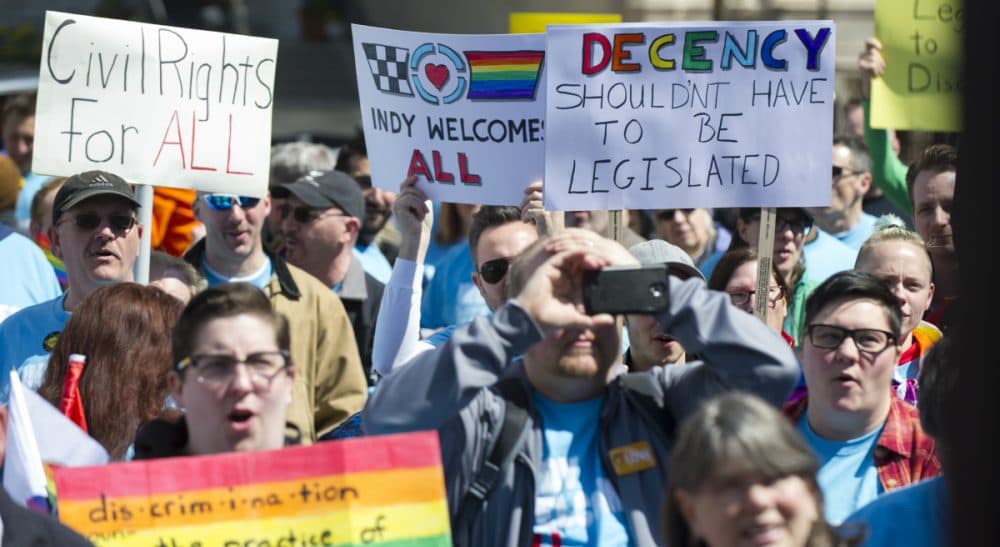Advertisement
What's The Matter With Indiana? Sadly, Religion

Bigotry masquerading as religious freedom: that, many say, was Indiana's law allowing businesses to turn away customers they find objectionable on religious grounds. Clearly targeting gay people, the law, declared one op-ed writer, invoked religious freedom as a “veil for intolerance.” The New York Times deems the law a “cover for discrimination.” The implication is that religion was a lovely fig leaf concealing ugly malice.
[Conservative Christians are] wrong that law should protect faith-based homophobia. It shouldn’t.
As a churchgoer, it grieves me to say that this lets religion off too easily. It was not a fig leaf but rather the root, the cause of the prejudice behind the law.
It’s true that theology has conservative and liberal schools of thought, with the latter affirming the humanity of all people. But the conservative Christians backing Indiana’s law doubtless are sincere in believing homosexuality a sin, and they can cite Scripture supporting their case. Yet they’re wrong that law should protect faith-based homophobia. It shouldn’t. (And didn’t: Indiana’s leadership, bowing to business protests, hastily scrubbed their statute of its anti-gay potential, while Arkansas's governor walked back a similar law there.)
We're sure to revisit this freedom-versus-rights argument again, which means we must understand why the latter justly trumped the former in this case. The best (if unpersuasive) case for Indiana's law came from the thoughtful Times columnist David Brooks. A conservative supporter of gay marriage, Brooks nonetheless offered two reasons for respecting Indiana's law.
First, “If there is no attempt to balance religious liberty and civil rights, the cause of gay rights will be associated with coercion, not liberation. Some people have lost their jobs for expressing opposition to gay marriage. There are too many stories like the Oregon bakery that may have to pay a $150,000 fine because it preferred not to bake a wedding cake for a same-sex ceremony.”
The problem with this thinking is that we fought this fight before — recently and more than once. Within my 56-year lifetime, some argued that the Bible sanctioned discrimination against African-Americans. Yet the 1964 Civil Rights Act mandated open public accommodations to all races. Meanwhile, Christian Scientists have been convicted for denying their children life-saving medical treatment on religious grounds. For the growing majority of Americans who don’t consider homosexuality wrong, it’s hardly a radical leap to legally curtail religious prejudice against gays, too.
Actually, the fundamentalist anti-gay case collapses under its own hypocrisy. As the late Harvard theologian Peter Gomes wrote, the Hebrew Bible Book of Leviticus does indeed outlaw gay acts. “But,” he added, “it also prohibits eating raw meat, planting two different kinds of seed in the same field and wearing garments with two different kinds of yarn.” Also verboten are tattoos and sexual intercourse during menstruation. Few if any fundamentalists stomp their feet over our failure to codify those restrictions. In the New Testament, St. Paul assails homosexual acts. Gomes argued that that reflected a condemnation of lust in everyone, including straight people. Even if you don’t buy that, Paul, like the author of Leviticus, was a person of his time and place, subject to contemporary mores. It detracts nothing from the spiritual value of either writer to note that mores change.
Brooks's second and bigger concern was practical. Epic changes in cultural attitudes, like gay rights, need to evolve organically; imposing them by law only triggers a backlash that would slow down the amazing gains in gay acceptance in recent years. Better for consumers to boycott anti-gay businesses, using the power of the market, than for government to coerce tolerance, he said on PBS's "News Hour."
Advertisement
...the law has long recognized that religious freedom stops at the shoreline of harming or discriminating against others.
History justifies his concern; just ask supporters of legalized abortion if Roe v. Wade imposed the closure on that debate they expected. But experience also teaches that respecting tradition can morph into blind indifference to injustice. Once again, the civil rights movement is instructive. Before the 1963 March on Washington, William F. Buckley offered the brief that Brooks would echo a half-century later: "There actually are true and wise friends of the Negro race who believe that a federal law, artificially deduced from the Commerce Clause of the Constitution or from the 14th Amendment, whose marginal effect will be to instruct small merchants in the Deep South on how they may conduct their business, is no way at all of promoting the kind of understanding which is the basis of progressive and charitable relationships between the races."
To his credit, Buckley recanted years later, conceding that "federal intervention was necessary" to dismantle Jim Crow. Today, it's not Amalgamated Socialists for a Racial Utopia who cowed red-state governors into shielding their gay constituents; it was corporate America, and however mercenary its motive, the businesses' lobbying shows the culture has evolved to where the law should embrace gay rights, as it did with blacks' rights, despite Buckley's misguided musings.
Religious traditionalists still have the right to think, speak, and worship as they wish. That is religious freedom. But the law has long recognized that religious freedom stops at the shoreline of harming or discriminating against others. In this imperfect world, contra David Brooks, more fines on bigoted bakers may be necessary.
